First conclave on e-mobility in North East India sees power-packed debate
OEMs, industry and stakeholders come together to discuss, debate and explore Synergies for developing an EV ecosystem for the North East and India as an overall market.
India, one of the youngest and leading automobile hubs, has been a quick adopter of new technologies, products and solutions, but the country has its own unique set of challenges and opportunities. Globally, the megatrend of electric mobility has been a major disrupter for the automotive industry; while some developed economies have successfully plugged into the new technological revolution, its acceptance in India, which is targeting mass-scale vehicle electrification, is still some time away.
Autocar Professional, India’s premiere automotive B2B title, in association with the Indian Institute of Technology Guwahati (IITG), today hosted a conclave on electric mobility at the elite institution today. The theme of ‘Building a Nationwide EV Ecosystem: Opportunities in the North East’ drew participation from senior officials of organisations such as Ashok Leyland, ANSYS, Lohia Auto, NonFerrous Materials Technology Development Centre (NFTDC), KPIT, IBM and Hero Electric as speakers.
The panellists for the day-long comprised Dr Seshu Bhagavathula, CTO, Ashok Leyland; Dr K Bala Subramanian, director, NFTDC; Ayush Lohia, CEO, Lohia Auto; Prof Rohit Sinha, HoD, EEE Department, IIT-G; Prof Praveen Kumar, EEE; KNS Acharya, VP, KPIT Technologies; Harshad Karve, technical director Asia, ANSYS; Abhinandan Kumar, Zonal Manager - Hero Electric; and Kiran Challapalli, IBM Watson Data & AI Platforms. The Conclave was moderated by Autocar Professional’s executive editor Sumantra B Barooah.
The first part of the session
Welcoming the delegates, IITG’s Prof Rohit Sinha said: “The North East offers some distinctive advantage over other states in the country for e-mobility. India has an ability to adopt disruptive technologies quickly.”
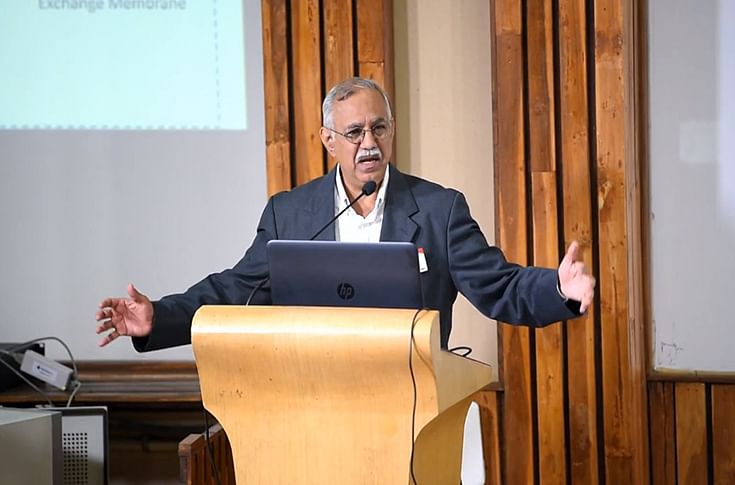
Dr Seshu Bhagavathula: "Ashok Leyland sees electrification potential for its engines for power generators. And in the future, OEMs will become operators of bus fleets (e-Mobility as a Service."
The keynote address delivered by Ashok Leyland's Dr Seshu Bhagavathula saw the industry veteran sharing his over-20 years of experience on the global and domestic auto industry. Dr Bhagavathula views electrification as the next big disruption for the automotive industry as a whole, which cannot be overcome by working in silos. He agreed that while a lot of things are being said and worked by the industry in terms of electric mobility, the charging infrastructure will be the game-changer. “Ashok Leyland sees electrification potential for its engines for power generators. And in the future, OEMs will become operators of bus fleets (e-Mobility as a Service)," said Dr Bhagavathula.
Sharing his optimism on the first e-Mobility conclave on in the North-Eastern region, he said, ”The North-East region should have local policies that will help the EV ecosystem develop. The start-up world should be supported with sufficient finance.” He added that there is a big opportunity for the industry and educational institutes to come together to increase localisation.
NFTDC’s Dr K Bala Subramanian shared his technical expertise/knowledge with the audience, many of them students from IIT-G, and said while the industry is working on the transition (ICE to EVs), India will need to “handle the shift carefully.” He reiterated the thought that while the opportunities globally were aplenty, Indian companies need to get into manufacturing of EV components or risk missing out an “important opportunity.”
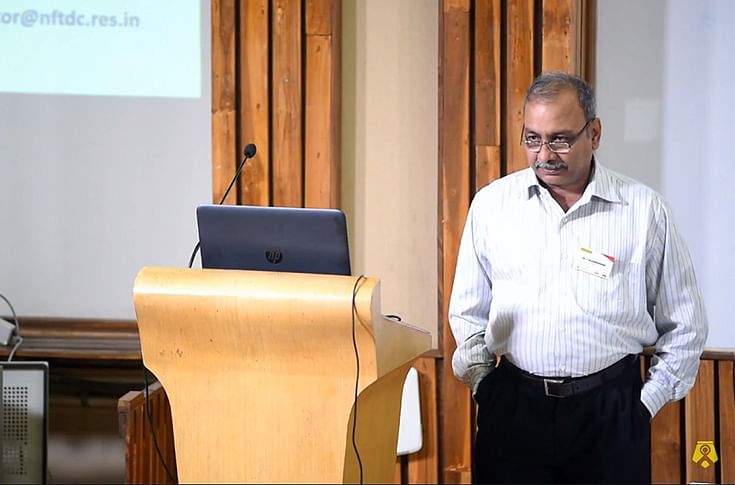
NFTDC’s Dr K Bala Subramanian: "India needs to handle the shift from ICE to EVs carefully."
Presenting his case on the trends in terms of mobility, he showcased analysis on the different powertrains and their potential in India. According to Dr Subramanian, “India needs to be technology agnostic. The percentage of electrification should be determined as per usage-demand pattern.” He made a strong case for hard hybrids and PHEVs over EVs in India.
OEM-speak
Bringing on the perspective of an electric vehicle manufacturer, Lohia Auto Industries’ CEO Ayush Lohia shared a brief background on the company as well as the outlook towards electrification in India. Making a strong case for helping the EV industry, he said, “The shift in the ecosystem can only come if all major stakeholders come together – government, technology, manufacturer and users.”
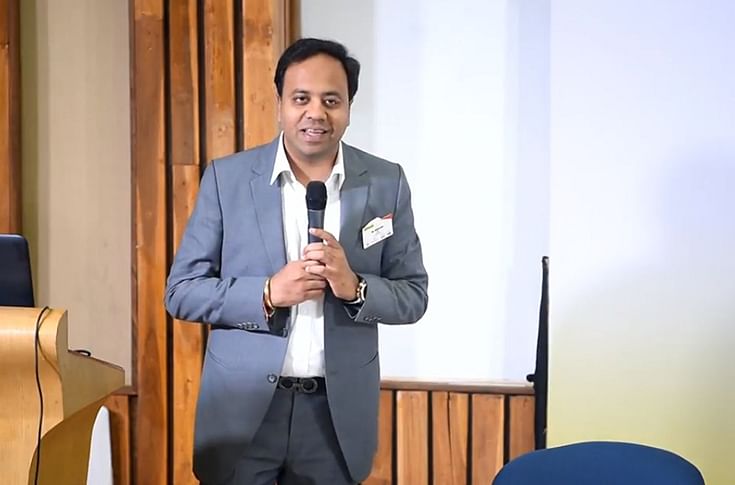
Ayush Lohia: "The shift in the ecosystem can only come if all major stakeholders come together – government, technology, manufacturer and users.”
Lohia felt that while a lot has been said about adoption of EVs in India, two-and three-wheelers are easily better growth drivers for e-mobility in India compared to their four-wheeled brethren.
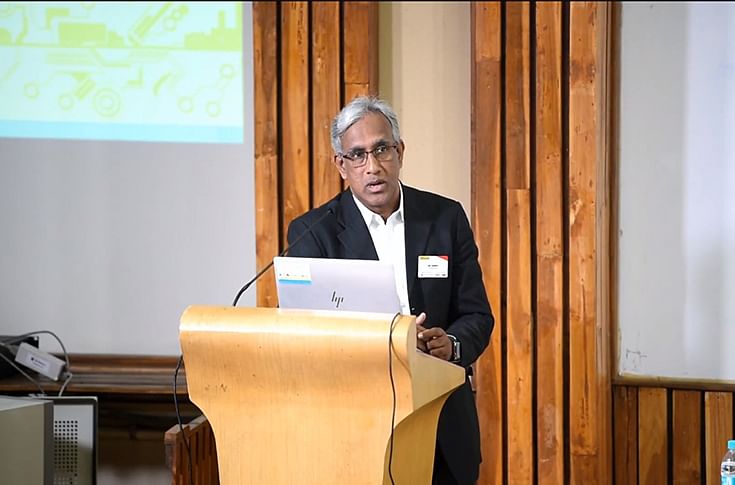
KPIT Technologies’s KNS Acharya: "KPIT is one of the few companies in India with immense expertise in the electric vehicle ecosystem."
KPIT Technologies’ KNS Acharya, while speaking about the company’s expertise in electrification, solutions and global presence, revealed the high level of collaboration it has undertaken with OEMs, Tier 1s and technology companies. “KPIT is one of the few companies in India with immense expertise in the electric vehicle ecosystem, both in India and abroad,” said Acharya.
He mentioned that there is a huge gap between industry requirements and the graduates fresh out of college. To address this, he said KPIT has undertaken numerous industry-academia partnerships to get onboard the right people for the job. He further explained that while the market is seeing multiple technologies existing simultaneously, there is a need for individuals who have the capability to convert theoretical knowledge into practical application, while also having the flexibility to work on different areas simultaneously. To address the scenario of finding the right talent, KPIT has partnered with around 20 universities in India, and plans to have a similar setup in Europe and other countries.
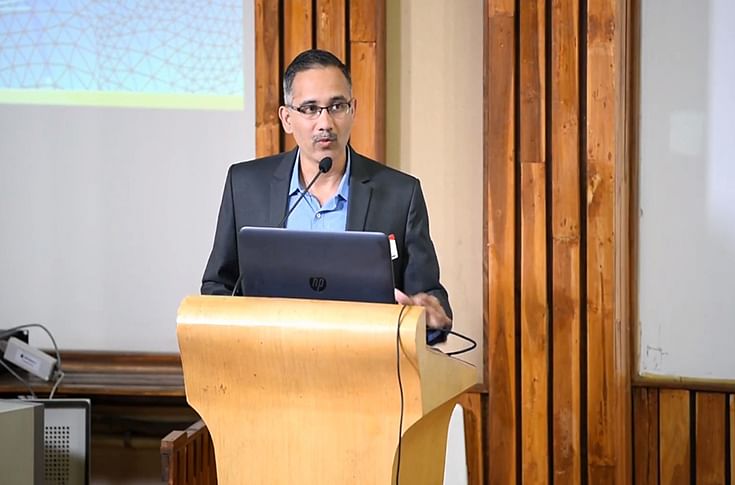
ANSYS' Harshad Karve: " “We have a comprehensive simulation environment for vehicle electrification. The timing is perfect for India to join the global electric vehicle revolution."
ANSYS’ Harshad Karve said that ANSYS has been closely monitoring the evolution of electrification and working with all leading global OEMs. He said, “We have a comprehensive simulation environment for vehicle electrification.”
Citing the company’s capabilities and benefit of simulation, he mentioned how the company worked with German car major Volkswagen on electric vehicle developed and helped it break the Pike’s Peak world record set by an EV (Volkswagen ID R). “OEMs globally have clear, well-defined strategies and goals on electrification. The timing is perfect for India to join the global electric vehicle revolution,” commented Karve.
According to Karve, it is not just the automotive industry which has been embracing simulation but the whole ecosystem can benefit from the technology, and also help in bringing products to life faster.
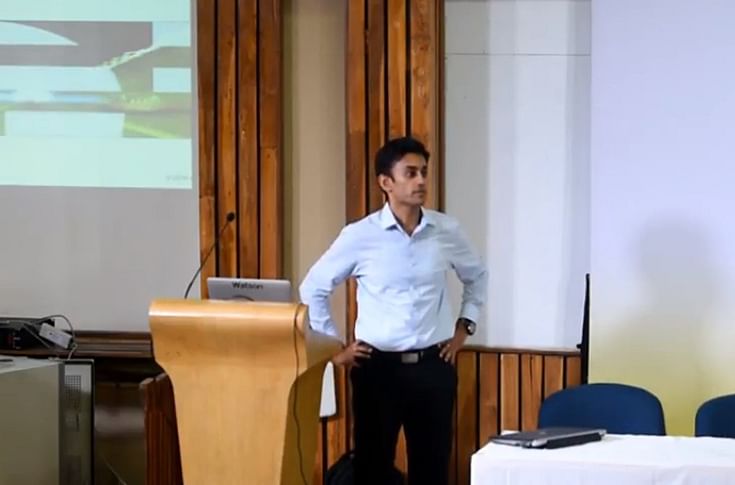
IBM Watson Data's Kiran Challapalli: "Maruti Suzuki India is a big IBM customer using both IoT and Watson platforms for providing a connected car experience."
Making a strong presentation on how artificial intelligence is making a huge difference to industry, Kiran Challapalli of IBM Watson Data & AI Platforms said: “IBM has a multi-stage approach to future mobility. Maruti Suzuki India is a big IBM customer using both IoT and Watson platforms for providing a connected car experience. Likewise, Honda Cars India which is also pushing connectivity in its vehicles."
He, however, cautioned that it is imperative the industry gets a helping hand: “Without proper government funding/subsidy, I don’t think vehicle electrification can be pushed.”
Representing the country’s first and largest electric two-wheeler manufacturer, Hero Electric’s Abhinandan Kumar shared interesting data and insights on the consumer trend over the years when it came to purchase of electric vehicles. While the overall growth percentage appeared pretty, the fact of the matter remained that electric two- and three-wheelers have been the driving force for electric mobility in India. Kumar said that Hero Electric has established a network of over 450 dealers; in the North East it has around 10 dealerships, which are witnessing healthy month-on-month growth.
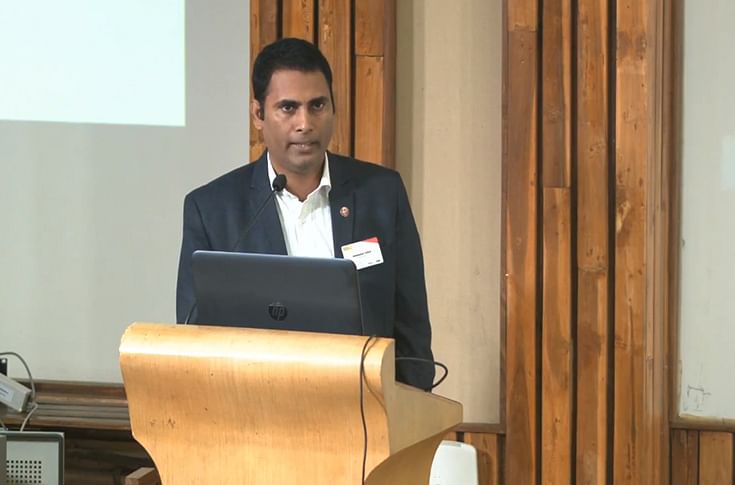
Hero Electric's Abhinandan Kumar: "Our 10 dealerships in the North East are witnessing healthy month-on-month demand."
Mentioning the consumer sales trend, he said while the preference for electric two-wheelers in India has been towards low-speed, budget-friendly scooters, it is slowly changing towards high-speed and more features. Backing the statement, Kumar revealed that while around 475,000 electric two-wheelers have been sold by all OEMs in the country, only 10,000 units constitute high-speed electric scooters.
Talking about the subsidy for EVs in India Kumar said, “The country has witnessed a roller-coaster ride when it comes to government subsidy. The schemes have been rationalised, withdrawn and reintroduced. In fact in September 2018, the government has rationalised the decision to give subsidy for electric two- wheelers with lithium-ion battery, which was not the case earlier.”
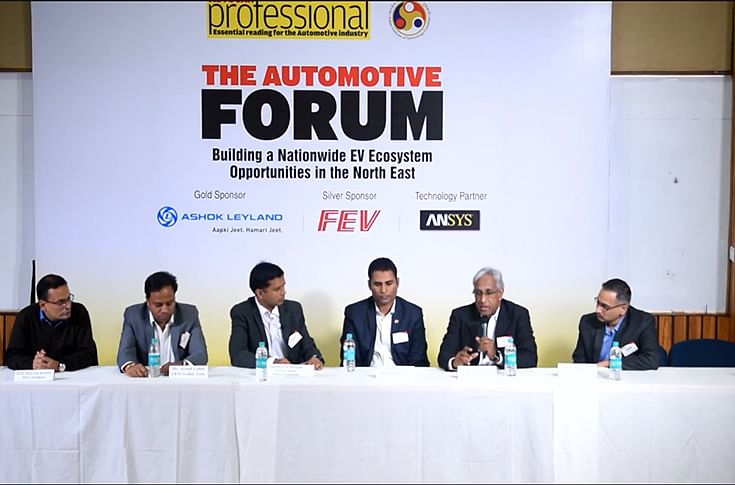
Lively panel discussion
Commenting on the state of the EV industry, Ayush Lohia, CEO, Lohia Auto said that there has been considerable progress over the past year. “About a year ago, few in industry were keen on e-mobility but now we see every known Tier-1 supplier evincing interest. It is a positive development but there is still a long way to go. The development time for a new vehicle to come on the road is almost 3-5 years but I foresee the shift will happen really fast.”
As regards the withdrawal of incentives on EVs, Lohia said, “There is obviously some negativity with the withdrawal of the subsidy but we were ready. We have various products with lithium ion technology and so we don't see a big hurdle other than finance, but even that is being taken care of.”
The second part of the session
KPIT Technologies’ KNS Acharya spoke about the need to accelerate industry-academia collaboration. “Premier institutes like the IITs should come forward to create content for the benefit of both. Around 65-75 percent of organisations have employees who are just undergraduates. We are hunting for nearly 500 power electronics engineers but not finding them. There is also a huge demand for local talent in the global perspective also. Academia should shed its ego and work with the industry now for co-creation. There is a dearth of multi-disciplinary engineers in India today. Such engineers are vital for driving innovation in the EV and automotive industry. ANSYS has come up with a Centre of Excellence at Cummins women's engineering college.”
Replying to a query on how to enhance industry-academia collaboration, Professor Praveen Kumar of IIT Guwahati said, “We recently implemented a curriculum revision of all the courses at IIT but including the industry related courses in that revision is not really feasible. However, we have started with PhD programmes. There should be sufficient relaxation from both the industry and the academia. The industry should not be too stringent on the non-disclosure agreements, the problem should not be on a specific industry product. The course should be based on the technology that is yet to come in. At academia level, we need to have very strong IP cells and the students should be sensitised about the ethics to be followed while working on industry projects.”
Adding to that Acharya said, “We have set up a university within our institute to train our employees on MatLab and other technical skills. However, if premiere institutes like IIT only focus on research, then the manpower development part is falling apart.”
Commenting on the North East region as a market for EVs, Lohia said: “This is not a virgin market because EVs already have some presence but right now it is at a very basic level. The main challenge is the hilly areas and we don't have a portfolio to cater to that market yet. The industry size and the area for us is very small but definitely, based on the products that are lined up in the future, it will be a key market in the near future.
IIT-G’s Professor Pravin Kumar said the North East region has become a key part of the national shift for electric mobility. “That’s because this is a technology where there are no clear leaders. It could also cater to the needs of South-East Asia as there is a good road link that is being established.”
Autocar Professional thanks IIT Guwahati, sponsors, the panellists and all the delegates for making the electric mobility conference a success.
RELATED ARTICLES
Cosmo First diversifies into paint protection film and ceramic coatings
The Aurangabad, Maharashtra-based packaging materials supplier is leveraging its competencies in plastic films and speci...
JSW MG Motor India confident of selling 1,000 M9 electric MPVs in first year
The 5.2-metre-long, seven-seater luxury electric MPV, which will be locally assembled at the Halol plant in Gujarat, wil...
Modern Automotives targets 25% CAGR in forged components by FY2031, diversifies into e-3Ws
The Tier-1 component supplier of forged components such as connecting rods, crankshafts, tie-rods, and fork bridges to l...






 22 Nov 2018
22 Nov 2018
 13781 Views
13781 Views





 Autocar Professional Bureau
Autocar Professional Bureau




